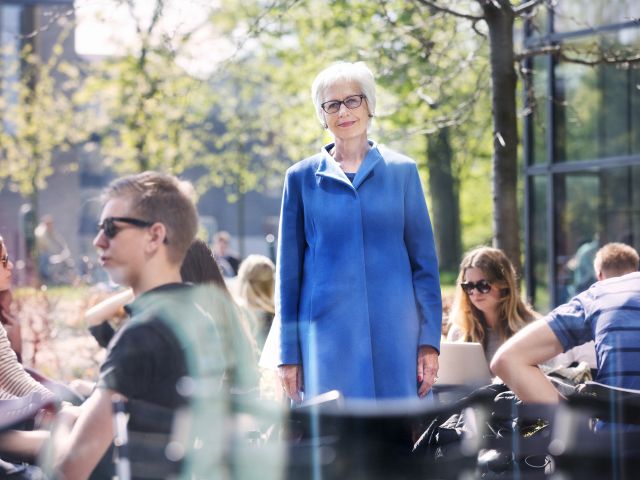Investigation reveals inexplicable differences in men’s and women’s pay checks at CBS

(Photo: Shutterstock)
Male faculty have a higher average wage than their female colleagues in all job categories – except two, an employee portfolio analysis shows. Most noticeable is the difference at associate professor level. A CBS researcher points out several potential explanations – including office housework – and calls for more transparency.
In the latest business survey of the employee portfolio at CBS, data about faculty’s pay have been scrutinized across various parameters, such as job category, seniority, and gender.
The conclusion?
“Men get higher average pay than women within all job categories – except for senior consultants and PhDs.”
The business survey, which was introduced for the first time back in 2020 at the request of the CBS Board of Directors, includes data about the composition of staff, job satisfaction, sickness, employee turnover, competence development and pay.
And as something special, this year’s employee portfolio analysis features a theme about VIP salaries, as the differences are more noticeable among scientific staff than among the technical and administrative staff at CBS.
For example, male associate professors earn on average DKK 1,200 more a month than their female colleagues, while male professors with special responsibilities (MSO) earn about DKK 900 more than female professor MSOs.
However, if you do not consider either job category or seniority, the difference in the contractual salary is DKK 5,400 a month between men and women – in favor of the men. According to the survey, this could be because more men than women hold highly paid positions, such as professors.
The differences in paid salary can, to some extent, be explained by the size of one-off fees (honorarer) and bonuses (engangsvederlag). For example, the difference in the average one-off fee was DKK 36,600 more to male associate professors than their female colleagues in same positions in 2020. However, both in 2019 and 2020, the average bonus given to associate professors was about DKK 10,000 more to women than men.
The business survey does not explain why the differences exist or where they stem from, but Herdis Steingrimsdottir, Associate Professor at the Department of Economics, who works in the field of labor economics with a particular interest in demography, gender and family, can suggest some overall considerations.
“When I look at the pay gaps for salary, the gap does not seem big, but when you see the differences in the annual one-off fees given to men and women, those are quite striking,” she says and continues:
“Research shows that differences in pay between men and women are largely explained by women disproportionally taking on more childcare. This may have been particularly problematic in the last couple of years. Anecdotal evidence suggests that women’s productivity suffered more than men’s during the lockdowns while children were home from school or daycare.”
Housework at home and at the office
When you are employed as a researcher, your job consists of many different tasks. You conduct research, you teach, perhaps you join committees and boards as an expert. On top of this are the types of tasks that are non-promotable, and women are more likely to take these tasks, explains Herdis Steingrimsdottir.
“Women are more likely to be assigned to do what we call office housework. Maybe you have to be in more committees at work because it lacks women, or maybe women are more likely to be asked to help plan the Christmas party. Suddenly, the women are busy with tasks that do not result in annual bonuses or promotions, while men have more time for their research,” she says and continues:
“And this can also explain the pay differences. I don’t know if that’s the case at CBS, but research has found this to be the case in academia elsewhere, so we should pay attention to how departmental tasks are divided between male and female faculty.”
If we have underlying biases that mean we are treating female faculty differently to male faculty, we should correct that
Herdis Steingrimsdottir
Therefore, she suggests that CBS should try to understand where the differences come from. Is it systematic or is it something that lies outside CBS’ capacity to tackle?
“The more transparency we have, the better. For example, men tend to be more reluctant to take parental leave or sick days with their children because they believe their employers will not accept it. We can address this by emphasizing equal expectations of men and women in the workplace,” she says.
One way of obtaining that knowledge can be through a survey, but Herdis Steingrimsdottir also suggests that departments speak openly about how bonuses are decided, as it clarifies what is taken into consideration for bonuses.
But why don’t women just say no to tasks that do not generate bonuses or promotions?
“It’s tricky. You would assume that women should just say no to these types of tasks, but research indicates that when women are expected to take on these tasks and are expected to say yes, they can be negatively affected if they say no. And even more so than men,” she says.
Continued efforts are needed
Although the employee portfolio analysis shows a difference in men’s and women’s paychecks, the analysis emphasizes that the difference “need not express a lack of equality, but could reflect differences that are not evident in the data, or differences that have not been considered in the analysis”.
Still, the authors of the analysis recommend that CBS continues to work on a project to develop a payroll management model for TAP staff, and kicks off a project to further develop a model for pay negotiations for VIP staff.
“The topic requires continuous attention from managers in the coming pay negotiations as well as in the allocation of teaching activities that are remunerated at department level, to ensure that any difference between genders is not caused by lack of equality,” it states.
The employee portfolio analysis was discussed at the meeting with the CBS Board of Directors on September 15.
Herdis Steingrimsdottir notes that if any underlying biases are driving the pay differences, they should be corrected.
“I think we always want to treat people the same way. Regardless of gender, nationality or other characteristics. If we have underlying biases that mean we are treating female faculty differently to male faculty, we should correct that and make sure that everyone has the same opportunities in the workplace,” she says.






































































































































Title: “Investigation reveals inexplicable differences in men’s and women’s pay checks at CBS”
“Inexplicable” definition: “unable to be explained or accounted for.”
Actual article: Gives many reasonable and logical explanations for the pay difference.
Top notch article.